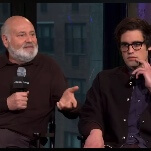The Films Of Jay Rosenblatt

Sorting through old industrial and educational films, home movies, and obscure archival footage, San Francisco-based experimental filmmaker Jay Rosenblatt transforms disposable scraps of celluloid into psychologically penetrating shorts about the human condition. A vital and provocative retrospective of five works made during the last decade, The Films Of Jay Rosenblatt vary in length and subject matter, but reveal an overarching concern with the nature of cruelty and evil. In "The Smell Of Burning Ants," his personal meditation on growing up male, these forces are instilled from a very early age. Images of young boys frying insects under a magnifying glass show an impulse for sadism, but the socialization process only encourages it, teaching them that sensitivity is a sign of weakness and group brutality a way of fitting in. Recalling an event from his own childhood when he was part of a mob that pummeled another kid, Rosenblatt draws out a defining shot of two boys fighting and a third sticking his fist into the action, just to join the crowd. His belief that evil cannot be dissociated from humanity segues beautifully into "Human Remains," which details the likes and dislikes of the century's worst dictators, including Hitler, Mussolini, Stalin, Franco, and Mao Zedong. Like a People profile, the voiceover narration rattles off meaningless personal trivia about these horrible despots: Hitler was an avid moviegoer and had occasional bouts with flatulence, Mussolini enjoyed regular manicures and loved bowler hats (which, according to him, were only championed by "Laurel, Hardy, and me"), and Mao never bathed and brushed his teeth with tea. Rosenblatt's point isn't to recast them in a more generous light, but to suggest that they can't be so comfortably removed from the ranks of ordinary people. His latest and most ambitious project, "The King Of The Jews," is a searing autobiographical history about Christian anti-Semitism that questions the enduring falsehood that Jews killed Jesus. Growing up Jewish, Rosenblatt recalls his innate fear of Christianity and the time when his mother took him to see King Of Kings at Radio City Music Hall. ("Much to [her] horror," the narrator muses, "the story of Jesus unfolded on the screen.") His mosaic culminates in the disturbing juxtaposition of a silent-movie crucifixion and documentary footage of the Holocaust. The program's other shorts are no less accomplished: "Short Of Breath" constructs a narrative out of early-'60s training films designed to teach doctors bedside manners, and "Restricted" consists of a funny one-minute montage parodying mixed cultural messages. Considered as a whole, the collection displays a remarkable continuity of vision, and, like all great experimental work, confronts the viewer with radical new ways of seeing the medium and the world.























![HBO teases new Euphoria, Larry David, and much more in 2026 sizzle reel [Updated]](https://img.pastemagazine.com/wp-content/avuploads/2025/12/12100344/MixCollage-12-Dec-2025-09-56-AM-9137.jpg)
















